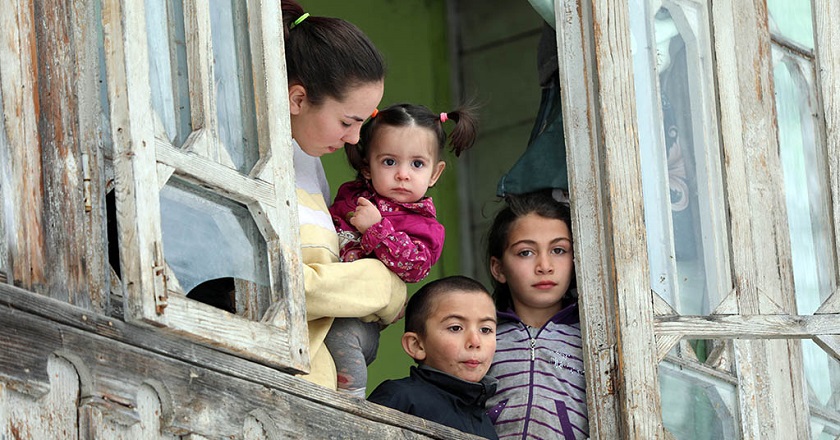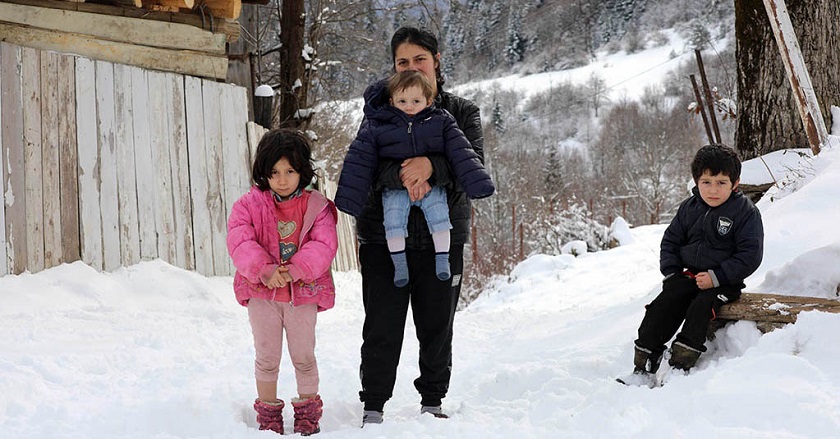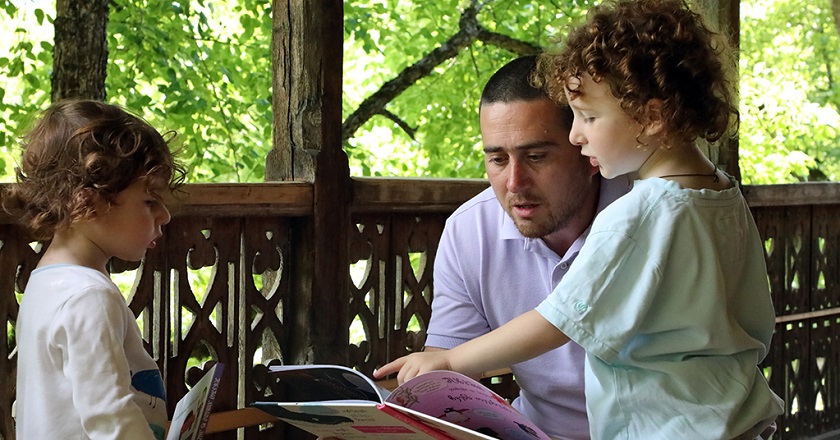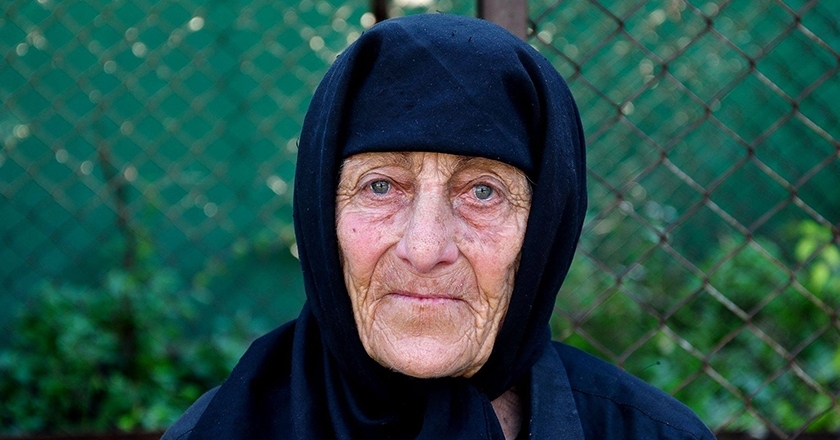Owing to an even direr situation in other corners of the region, Ghebi, although dwindling, is still one of the largest villages in mountainous Racha, boasting a tally of 30 children, largely thanks to the contribution of the Pavle and Gia Bokhashvili families.
Pavle and Gia have 7 and 6 children, respectively. 5 of them are of preschool age. We did stipulate in the Article 27 of the Constitution of Georgia that everyone has an inherent right to education, including preschool education, but Ghebi children have no awareness, let alone experience, of kindergarten.
“Kids here are completely cut off from the outside world. That is why the youth is deserting the village at the first opportunity. It’s been two years since the construction of the hydroelectric station started. They come here in summer for the sake of seasonal wages; leave in winter. What can the young do here? What are their prospects? Nothing. They say to raise livestock; not everyone wants to care for cattle. There is a potential for tourism, but visitors want renovated homes for lodging. Accommodating homes takes money; there is none. You go to a bank and they will strip you to the bone; take you for your last cent. No one gives you a grant, no one assigns us a priority. People are fleeing to the city. Your showing up is the first instance anyone reached my yard by car during the winter months. Our three-wheel-drives are rendered useless the road gets snowed in so much, and sometimes I don’t know how to pave my way to bring my kids to school. In recent years, the snow piled up to two meters and more. Neither the teacher (singular) wants to stay here, despite the additional mountain allowance to her salary. When you assign five subjects to a sole teacher, that’s no education’’. Not Pavle, just yet, but Gia Bochoshvili is already looking into moving his family to the nearby town of Oni, or at least somewhere in the vicinity.
A few years ago we asked for a kindergarten. They promised it will be done. So, has it? They didn’t even follow up on the request. There’s nothing here but the school. Children have interests here, they want to play sports; attend music lessons; evolve. That’s why I’m trying to buy a house in Oni and move there, for the kids. I don’t want to leave here, but the children want to study. They are devoid of everything. We have fresh air, mountains, river, and snow, but this is not enough anymore, these are different times. That’s why villages are emptying. You go to Tbilisi and there’s no remaining space to cram a car or slot a house”.
Leading up to Ghebi is the village of Chiora. Population headcount of 2014 counts 116 residents. The permanent resident tally has further reduced in the past eight years, with Vazha Gobedzhishvili parenting the only two preschool-aged kids, two and four years old. The school building, designed to accommodate up to 150 students, has five – three in the 5th grade, one each in 6th and 7th.
“There are at least more than 10 single young in the village. Everyone is close and/or related to each other. The youth almost never leave, they are enclosed in the village. Apart from the crippling lack of stable income, this is one of the reasons for celibacy.
Now that the dam is being constructed, at least seasonal job opportunities have been made available. If not for that, we might have been completely devoid of youth by now,” explains Vazha, who is an Oni mayor representative in the village. Excluding the teacher and the attorney, there are no other stable jobs in the village.

Ghebi and Chiora villages border the occupant Russian Federation. “There are one, two, three, four mountain passes that a person can freely move across during the summer. If the borderline regions are devoid of inhabitants, what is the border guard going to do alone? While it’s true that their North Ossetia mountain villages are deserted too, they are incoming with a different strategy,” Pavle refers to the rapidly accumulating Russian interests in the region and an alarming warming-up of Georgia-Russia relations.
The entire Ghebi village unitedly opposes the moves by the Georgian government to transfer 104 712 hectares of forest into a 49-year effective ownership of the Russian oligarch’s close partner, Davit Khidasheli. A resolute refusal is a collective reaction on even holding discussions of the drilling of a tunnel under Mamisoni Pass – if not for Roki tunnel, we would have possibly had one less occupied region”.
“Who will meet them when they cross over?” Pavle Bokhashvili is asking.
They were intercepted, that’s why Russian soldiers aren’t advancing further front, in Tsedisi. Tens of hectares of mowing pastures are disused by Tsedisians after the Russo-Georgian War of 2008. Not a year has passed since the war when the occupants tied father and son Abesalom and Mate Maisuradzes to a tree in Tsedisi pastures and took their bulls.
After the war, growing fears of the conflict spilling over further inward from the unstable border was also a contributing factor to the exodus of youth from Tsedisi, the bordering region of the occupied Tskhinvali. There were 163 residents in Tsedisi in 2002, which was reduced to 53 by 2014. Between counts, the population was reduced by a factor of three. And not even that remains. “In winter, only about 20 of us remain,” tells us Mediko Maisuradze, a permanent resident of Tsedisi and the school’s former headmaster. Tsedisi school had its final student in 2011, then closed. There were simply no more children in the village. The building is still being maintained in hopes of a glimpse of light emerging at the end of this long tunnel. And it has. “Two kids were born in the northern district, but due to a lack of a kindergarten, the families moved to Oni. You can’t blame them. I, myself, and my peers never attended kindergarten either and went straight to school, but those were different times; today has different challenges. Currently, Mate and Mariam Maisuradze have three children – one has turned 6 and is of school age, the other is 4, third is less than 1”.
Maisuradze family, the only one with children, is pleading for the establishment of a kindergarten. They have nowhere to move, or else the village would lose its only remaining children.
There are plenty of problems in Tsedisi, lack of transportation included – a shuttle to the regional hub departs once every two weeks if that. It used to connect once a week. The United Nations gifted us a car, but the Municipal Hall took it, stating they will find the best use for it, and ended up appropriating it for personal use. We have to take care of cattle and grow crops by hand and still use bulls to plow the land, there’s no specialized equipment. That’s why the youth are taking flight. 10-12 under-40 still remain in the village, but all unmarried,” – Mediko Maisuradze sees salvation from the increasing skewing of the average age toward elderly and the impending prospect of village’s disappearance in reviving a kindergarten and a school – “if not, the sole family with children will leave, and no one else will settle here”.

Providing standardized preschool education for children under 6 is the responsibility of the entire municipality. According to information elicited from Oni Hall by Mountain Stories, there are no plans in place for opening a kindergarten in Tsedisi. Decision-makers are citing the insufficient number of children as the reason for refusal. Georgian law on “early and preschool education and care” emphasizes that preschool care and education is all-inclusive and universally accessible for all children of the appropriate age. The law does not define the minimum number of children required for obligatorily ensuring access to education.
Oni municipality features just two kindergartens, with 82 children in Oni town and 7 in Glola village. Oni pre-kindergarten opened two school readiness centers in Utsera and Chiora. The program implies a 3-hour daily study from Monday to Friday, which cannot replace a full-fledged kindergarten.
Insufficient contingent – is the chiefly cited reason why children in Racha’s drained villages are not getting preschool education.
Across the villages of the entire region, there are just 61 children under the age of 6: 5 in Ghebi, 2 in Chiora, 11 in Glola, 2 in Utsera, 7 in Chinchvisi, 6 in Lagvanta, 5 in Sakao, 9 in Ghari, 2 in Komandeli, 1 in Jashkvashi, 3 in Tskmori, 1 in Qvedrula, 2 in Tsedisi, 1 in Kvashkhieti, 4 in Sori.
No more children under the age of 6 in 49 villages.
Unlike Ghebi and Chiora, Sori is a roadside village that fills the gap between and links regional hubs - Ambrolauri and Oni, which, on the face of it, should make it relatively busy and important, but it is depleted nevertheless. Sori middle school has no more students between 1-6 grades. There’s one student each for 8th, 10th, 11th, and 12th, and 2 in 9th. One student recently joined from Rustavi City.
Rusudan Metreveli has worked here as a teacher of Georgian language and literature since 1993. She remembers the time she joined the school; it was flourishing back then, numbering 150 students from all over the region: Sori, Gadamsha, Chvebari, Farakheti, Shardometi, and other villages. Gadami boasted a separate primary school, which is now the only one from Oni to Ambrolauri.
Levan Kervalishvili returned to his ancestral house in Racha from Tbilisi five years ago. Iona was five years old at the time, second child – Isaya, was born in Sori. Out of a bouquet of issues faced by the newly returned family in the region, Levan singles out the lack of preschool education availability as the most troublesome. Another family in Sori is home to two preschool-aged kids. City Hall offered Levan to improvise a school readiness program in one of the school building’s rooms, which he declined.

“The idea of a kindergarten is to help kids develop and prepare them for school, which implies intellectual, physical, cognitive, and creative development, individual and group self-expression, and socialization, the latter, of such utmost importance for Racha’s children. I would love to see a kindergarten and a school in my village, attended by many children. If anyone is a patriot of this region, I am one of them, but no one seems set on returning and settling here with their family. I honestly pity the children in these conditions. When Iona reaches school age, by that time, Sori’s school will have two students. She will end up alone not just in class but in school. Some think that this is good for her, as the teacher will focus solely on her, but I don’t share this view. A child but be placed in a competitive environment. 1-child and 3-child classes will fall short of delivering the results that preschool and school education should. Of course, Sori is placed such that I can opt to enroll my children in Oni kindergarten or school, instead.
As to high mountainous regions, which are far from regional centers, and no workaround options exist, it’s not just preferable but should be mandatory to establish kindergartens and schools. Moreover, children should be helped in other ways. Once a week, they could bring them to towns, have them spend a day there, and involve them in activities.
Levan knows that should he not admit his children to school, the school may close down, which is painful to him, but ‘’on the other hand, I can’t sacrifice the best interests of my child. If I could see the prospect of someone returning to the village, even in 4-5 years, and raising the number of children, I’d give it a thought, but I don’t.”
According to 2021 data, only up to 5500 people lived in Oni municipality, 630 less than in 2014. Just 47 children were born there throughout 2022; 134 died. The death rate is almost triple that of birth.






